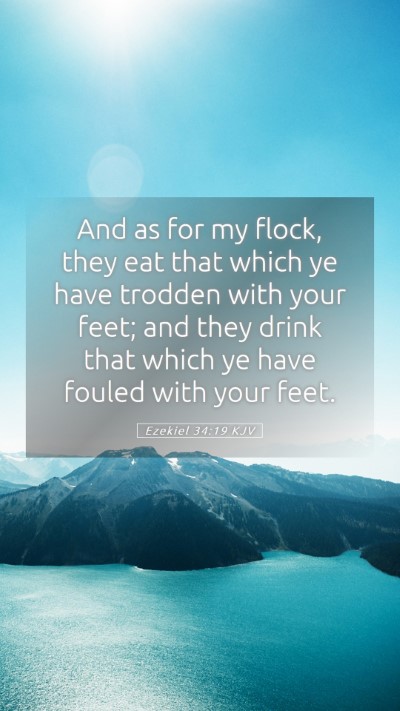Bible Verse Commentary: Ezekiel 34:19
Bible Verse: Ezekiel 34:19 - "And as for my flock, they became a prey, and my flock became meat to every beast of the field, because there was no shepherd."
This verse from the book of Ezekiel presents significant themes regarding spiritual leadership and the welfare of God's people. It illustrates the consequences of neglecting one’s duty as a shepherd and the vulnerability of the flock without proper guidance.
Contextual Understanding
The context of Ezekiel 34 is a prophecy against the unfaithful shepherds of Israel, who failed to care for their people, leading to their suffering and dispersion. God’s complaint is against the leaders who exploited rather than nurtured the flock, and the metaphor of sheep and shepherds is rich in biblical imagery, pointing to both physical and spiritual neglect.
Key Themes and Interpretations
- Shepherd and Flock: The shepherd symbolizes leadership, while the flock represents the people of God. This passage serves as a reminder of the responsibility leaders hold and the consequences of their failure.
- Vulnerability and Predation: The imagery of the flock becoming prey illustrates the dangers of being without proper guidance, emphasizing the need for spiritual oversight.
- Divine Judgment: There is an underlying message of divine judgment against those who neglect their responsibilities, impassioning the call for faithful shepherds guided by God’s wisdom.
Commentary Insights
Matthew Henry notes that the neglect of shepherding leads to the people being easily overtaken by dangers, both physical and spiritual. He stresses the importance of spiritual oversight for the health of the community.
Albert Barnes emphasizes the absence of proper leadership as the root cause of the flock's peril, explaining that true shepherds should protect and nutrify their flocks. Thus, the failure of leaders leads to dire consequences for the sheep.
According to Adam Clarke, this verse reflects God's discontent with the past leaders and implies a promise of future restoration as God Himself would take charge of His flock. Clarke also highlights the idea that the flock’s suffering is a direct result of the shepherds’ negligence.
Applications and Modern Implications
In today’s world, this scripture can be applied to the importance of accountability in leadership, encouraging individuals in positions of authority to lead with integrity and compassion. It serves as an important reminder that leadership is not merely a position but a profound responsibility that affects the well-being of others.
Cross References
- John 10:11: Jesus identifies Himself as the Good Shepherd who lays down His life for the sheep.
- Psalm 23:1: "The Lord is my shepherd; I shall not want," expressing God's guidance and provision for His people.
- Jeremiah 23:1-4: A condemnation of the irresponsible shepherds of Israel, paralleling Ezekiel’s message.
Conclusion
The meaning of Ezekiel 34:19 invites readers to explore the significance of biblical leadership and the responsibilities that come with it. As part of a larger narrative on care, protection, and divine justice, it encourages personal reflection on one's role within spiritual communities, emphasizing the necessity of nurturing and safeguarding the well-being of others.
Further Study Resources
For those seeking deeper Bible study insights into this verse and similar passages, consider using online Bible study tools or joining Bible study groups. Engaging with Bible study guides and Bible study courses can provide enhanced scripture analysis opportunities, facilitating a richer understanding of difficult Bible passages and their applications to daily life.


